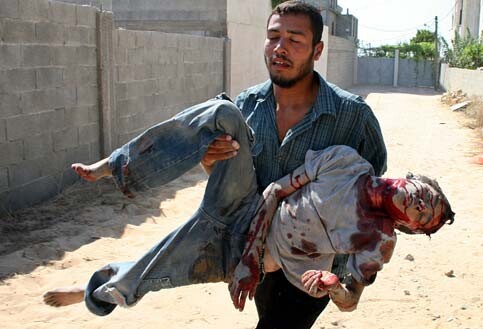International Committee of the Red Cross 7 July 2006

A Palestinian carrying the body of a murdered boy after Israeli mobile artillery fired shells at Beit Lahiya in the northern Gaza Strip July 6, 2006. (MaanImages/Mohamed al-Zanon)
The situation in the Gaza strip remains tense with the escalation of violence having a serious impact on the population there. In particular, restrictions of movement and the shortage of electricity following the destruction of Gaza’s only power plant are having serious consequences. The ICRC’s head of sub-delegation in Gaza, Giorgios Georgantas, gave this interview.
What is the humanitarian situation like in Gaza today?
The number of casualties, including civilians, is increasing by the day. The ongoing military operation in the north of the Gaza Strip has had a very serious impact on the population living there in terms of access to basic goods and services, including food. Some houses are isolated and people are afraid to leave, others have been forced to stay in their homes because of the military operation. The whole of Gaza is suffering from a lack of electricity following the destruction of the only power plant. Repairs will take months. Israel is providing a partial supply but on rotation and it is not sufficient to cover all needs. IN particular, hospitals and a large part of the water supply and sanitation systems are now dependent on back up generators that consume large quantities of fuel that is in short supply due to the closure of crossing points between Israel and the Gaza Strip. Access to drinking water may soon become a serious problem. There is still no acute shortage of food or medical supplies reported. However, with the very restricted movement of goods coming into the Gaza Strip, there is an impending risk of shortages. The flow of goods needs to be regular to satisfy the needs of a population of 1.4 million which relies heavily on imports of basic food items. Since the beginning of the crisis, Karni crossing has been open very irregularly and only to allow the passage of humanitarian convoys.
How would you describe the general mood of the population in Gaza?
There is a great tension in the Strip and huge psychological pressures on its residents. Israeli sonic booms have a terrifying effect making the houses shudder. Most of Gaza’s population was already living in very difficult conditions. They now fear that the ongoing military operation will exacerbate their hardship and their living conditions that were already seriously compromised by increasingly stringent restrictions of movement. Today, farmers in many areas in Gaza cannot access their land and fishermen cannot earn their living. Well before the start of the military operation and imposed closure, the ICRC had warned of the possibility of a major humanitarian crisis in Gaza and the West Bank following the decision to withhold funds and aid to the Palestinian Authority. Subsequently, the ICRC stepped up its aid to the Palestinians and increased its annual budget by 10 million Swiss francs. Palestinians, notably in the Gaza Strip, are known for their resilience but at the same time, their level of frustration is very high and they find it increasingly difficult to cope with these harsh living conditions.
What is the ICRC’s response to the current crisis?
Since the beginning of the crisis, the ICRC has been closely monitoring the situation on the ground and responding to urgent needs whenever they arise. On July 5, after lengthy negotiations, a team from the ICRC obtained access to Beit Hanoun where the major military operations are taking place. The ICRC distributed 110 food parcels, jerry cans and medicines to residents who had problems moving around because of military tanks operating close by. On July 4 and July 6, following negotiations with the Israeli authorities, medical supplies loaded on ICRC trucks were brought in the Gaza Strip and provided to the Palestine Red Crescent Society. Also on July 6, 16,000 litres of fuel were delivered to the water authorities in Gaza to be dispatched to various water stations in the Strip. 4,000 litres have already been delivered to water stations in urgent need of fuel. We maintain close contact with the Palestine Red Crescent Society and coordinate passage for their ambulances. We are receiving scores of calls from Palestinian residents asking for our assistance either because of medical emergencies or because of a lack of basic supplies. We stand ready to provide further assistance and have brought in additional food and non-food items which will be distributed according to need.
What messages is the ICRC giving to those involved in the current crisis?
The ICRC, whether publicly or through its contacts with the various parties – Israeli and Palestinian – continues to urge all those involved to take precautionary measures to spare civilians, refrain from indiscriminate attacks which hare prohibited under international humanitarian law and protect public and private property. The principle of proportionality in the conduct of hostilities should also be respected at all times. No military operation should inflict unnecessary harm and damage compared to the military advantage gained. Within the frame of our dialogue with the Israeli authorities, we remind them of their obligation to ensure that the population continues to have access to basic goods and services such as food, water, medical care, and shelter. Our main message is that civilians should not pay the price for military operations. In addition, through our regular contacts with Palestinian groups, we urge those who have the captured soldier to treat him humanely and respect his life and dignity.
Related Links